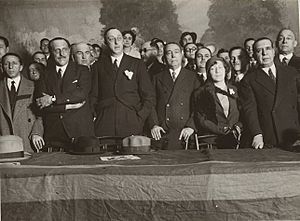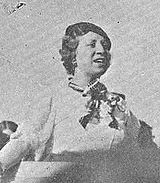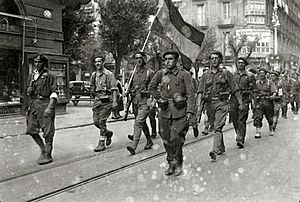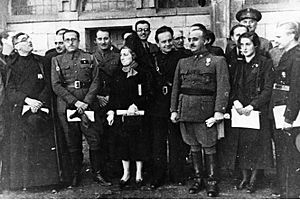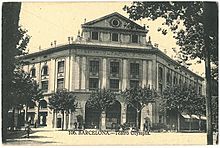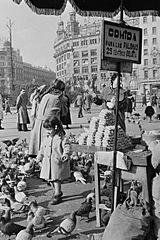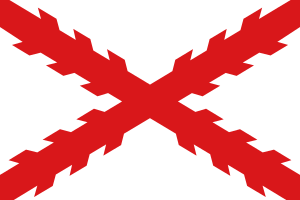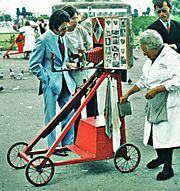María Rosa Urraca Pastor facts for kids
Quick facts for kids
María Rosa Urraca Pastor
|
|
|---|---|
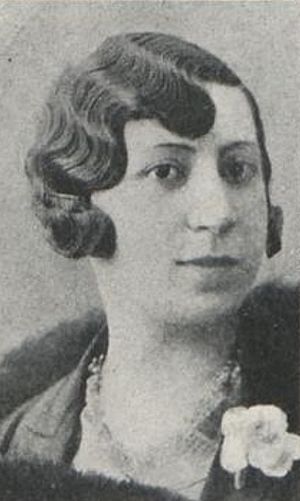 |
|
| Born |
María Rosa Urraca Pastor
1900 Madrid, Spain
|
| Died | 1984 (aged 83–84) Barcelona, Spain
|
| Nationality | Spanish |
| Occupation | teacher |
| Known for | orator, propagandist, politician, nurse |
| Political party | Comunión Tradicionalista, Falange Española Tradicionalista |
María Rosa Urraca Pastor (1900–1984) was a Spanish Carlist politician and speaker. She was famous for her exciting speeches, making her one of the best public speakers during the Second Spanish Republic. She also led a group called Delegación Nacional de Frentes y Hospitales. This group helped wounded soldiers during the Spanish Civil War for the Nationalist side.
Contents
Early Life and Education
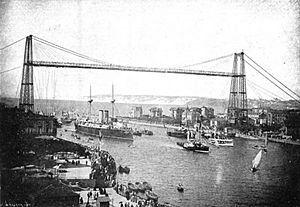
María Rosa Urraca Pastor was born in Madrid, Spain, in 1900. Her family moved often because of her father's job in the army. They lived in Burgos and later in Bilbao. María Rosa grew up in a very Catholic home. Her father was part of many religious groups, and he taught her to be very religious too.
She also learned to respect the military, seeing it as very important for the country. When she was 14, she was inspired by books from Concepción Arenal and Graciano Martínez. These writers encouraged women to be active in society and do social work.
María Rosa went to Escuela Normal Superior de Maestras de Vizcaya and finished in 1923. She later claimed to have studied Philosophy and Literature. She started her career as a teacher at La Obra del Ave-María, a group of Catholic schools for poor children in Bilbao. She also taught at Escuela Normal de Bilbao. María Rosa never married and did not have children.
Starting Public Activities
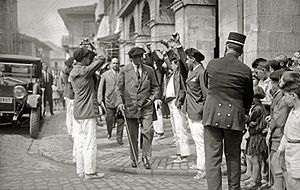
María Rosa first spoke in public in 1923 in Bilbao. In the mid-1920s, she joined Acción Católica de la Mujer (Catholic Women's Action). She became the manager of their local newspaper in 1925. She was very active in social, charity, and education projects.
She also started working with radio broadcasting, giving talks on cultural topics. She even wrote for El Sol, a newspaper in Madrid. María Rosa became a role model for Catholic women who wanted to be active in public life, not just at home. In 1929, she became a state official as a labor inspector. She worked on projects to help people with disabilities find jobs. She also wrote articles for newspapers in Bilbao and other parts of Spain.
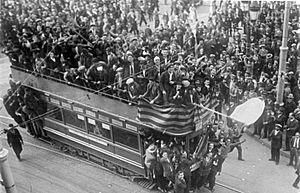
When the monarchy ended in 1931 and the Second Spanish Republic began, María Rosa was very upset. She quickly joined public protests supporting the monarchy and against the Republic's policies. She helped create a conservative women's group called Agrupación de Defensa Femenina. This group brought together different conservative women. She was very busy, helping to organize many meetings.
Becoming a Carlist Leader
While working with other right-wing women's groups, María Rosa met Carlist women. She was very impressed by their strong Christian faith. She soon joined the Carlists, a traditionalist political movement. She quickly became a rising star in their propaganda efforts. Her experience in Catholic groups, radio, schools, and newspapers made her a powerful speaker.
By 1932, she was speaking at Carlist and Catholic meetings all over Spain. She became a well-known Carlist figure. Even her political opponents noticed her. In the 1933 elections, she ran for parliament in Gipuzkoa as a Carlist. She did not win, but she continued her intense speaking activities across Spain. She became known as an exciting and passionate speaker.
In 1934, the Carlist leader Manuel Fal Conde asked her to reorganize the women's sections of the Carlist party. These groups were called Margaritas. María Rosa worked to turn them into a strong national organization. By 1936, the Margaritas had 23,000 members. She encouraged them to take nursing courses, preparing for possible conflict. In 1936, she ran for parliament again but was not elected. She also helped set up Socorro Blanco, a Carlist relief organization.
Role in the Civil War
When the Spanish Civil War started in 1936, María Rosa joined the Nationalist troops. She worked as a nurse on the front lines, helping wounded soldiers. She also organized Carlist medical services, recruiting women as nurses. She was known for her compassion, sometimes helping Republican prisoners.
In 1937, she met Francisco Franco, the leader of the Nationalists. She joined the women's section of the new state party, Falange Española Tradicionalista. She became one of its leaders, managing the Delegación Nacional de Frentes y Hospitales. This group was in charge of caring for the wounded. She was also appointed to the National Council of the Movement, a key governing body. This led to her being removed from the Carlist party.
María Rosa had disagreements with Pilar Primo de Rivera, another leader in the women's section of Falange. Their conflict grew, and María Rosa resigned from her leadership roles in July 1938. This caused many Carlist women to leave the Falange. Although she received an award for her service, she later left the Falange leadership and retired from public life.
Life After the War
After the Civil War ended, María Rosa was only 39 years old. She moved to Barcelona with her parents. In Barcelona, she turned her home into a place for cultural gatherings, hosting events with music, painting, and theater. She did not go back to teaching.
In the 1940s, María Rosa started giving public lectures. These talks were often about patriotic values and were very popular. She would perform them like a theatrical show in places like Teatro Olympia.
In 1940, María Rosa published her wartime memories called Así empezamos (How We Started). The book praised those who helped the Nationalist war effort. She also started her own publishing house, MRUPSA. Through this, she published two biographical books she had written about historical figures. The publishing business stopped in the late 1940s.
To support her family, María Rosa began giving lessons in public speaking in the mid-1950s. She advertised these lessons regularly in newspapers until the late 1960s. After her father passed away in 1965, she became more private.
Later Public Involvement
After 1942, María Rosa mostly disappeared from politics. She focused on local church and community Christian activities. She continued her earlier teaching work by running courses for a group called España Cristiana. She also stayed interested in social issues by helping with Catholic charity work.
In the early 1940s, she still attended some large Carlist events. However, she was not involved in the main Carlist political groups. Some people believe the Carlists never fully forgave her for joining Falange during the war.
Towards the end of her life, María Rosa became more publicly active again, rejoining the Carlist movement. At this time, the Carlists were divided. She sided with the Traditionalists, who opposed the socialist views of another Carlist group. She continued to speak out against this group until 1974.
In the late 1970s, she supported conservative groups after Franco's death. She continued to visit political offices and was known for her strong commitment to her beliefs. Until her death in 1984, María Rosa Urraca Pastor always considered herself a Carlist. In a letter in 1982, she proudly confirmed her lifelong identity.
See also
 In Spanish: María Rosa Urraca Pastor para niños
In Spanish: María Rosa Urraca Pastor para niños
- Carlism
- Sección Femenina
- Second Spanish Republic
Images for kids
-
PE at Escuelas Ave Maria
 | John T. Biggers |
 | Thomas Blackshear |
 | Mark Bradford |
 | Beverly Buchanan |


